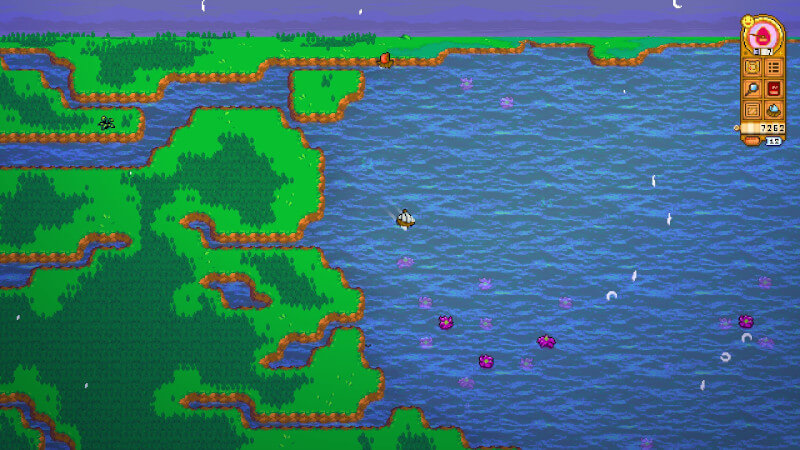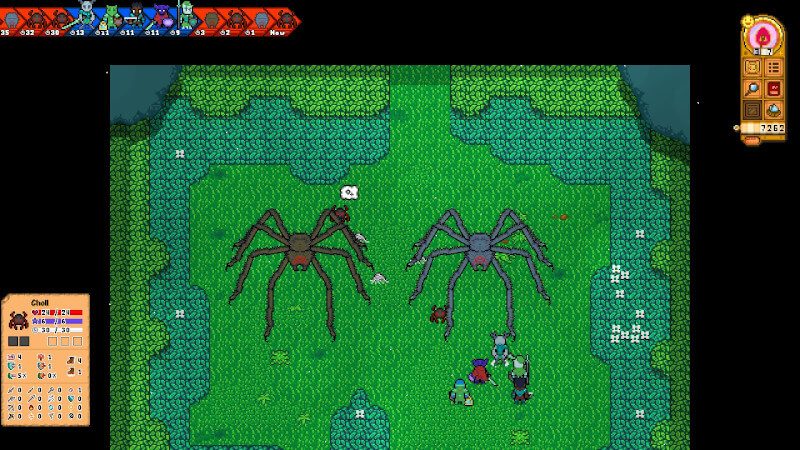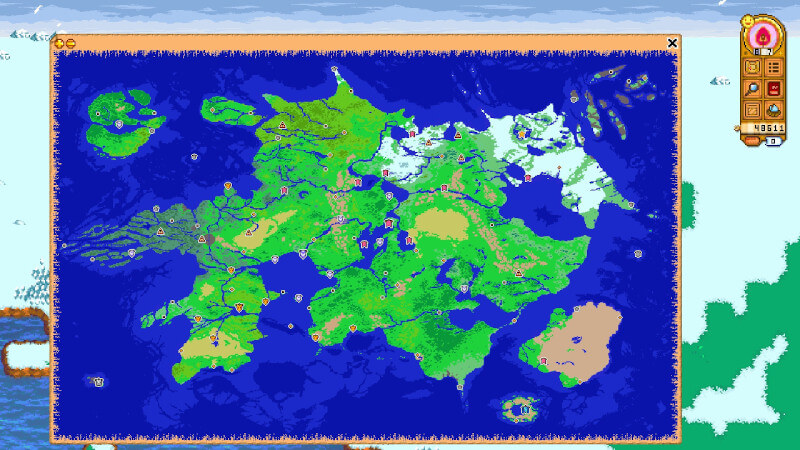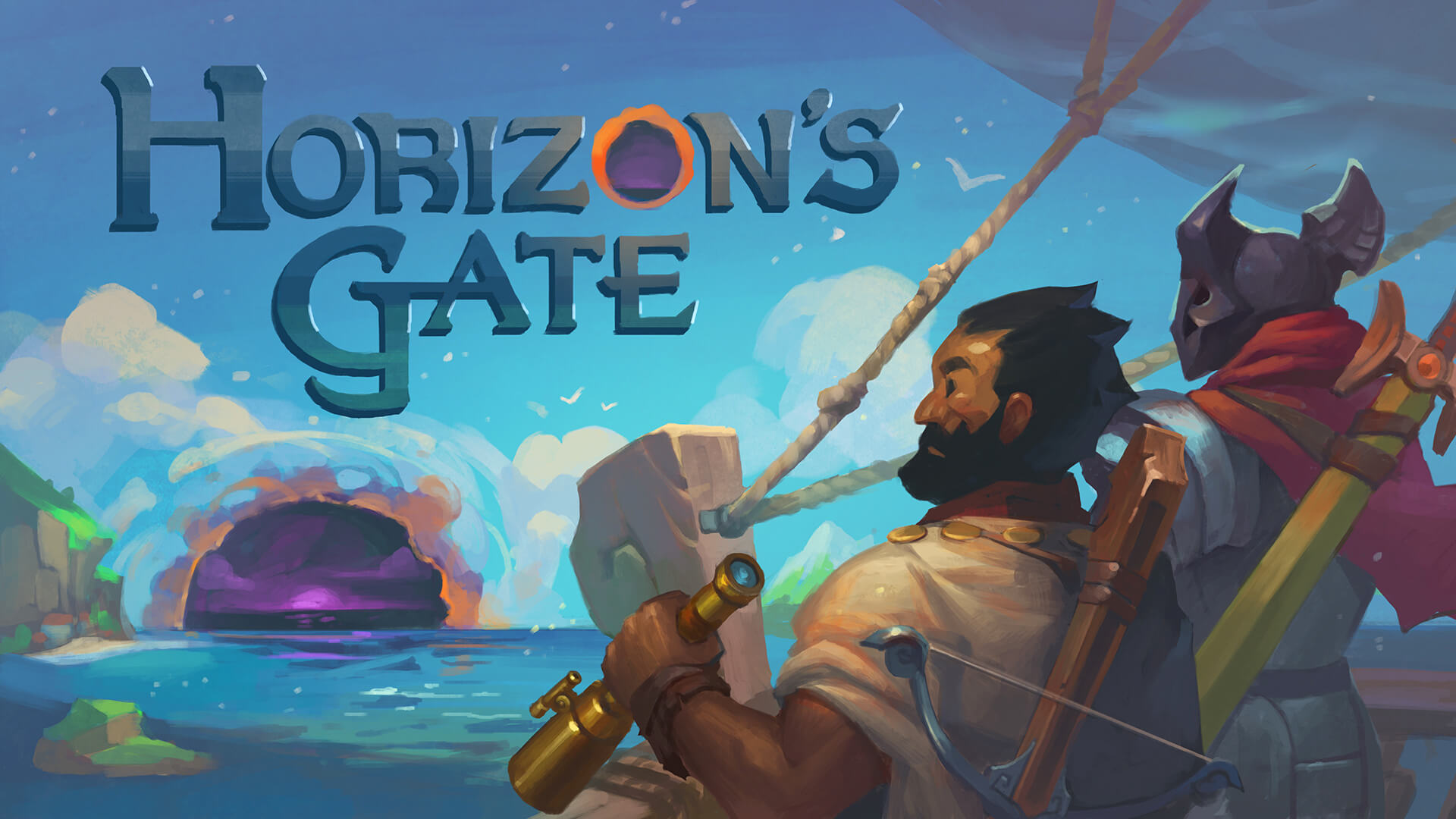Title: Horizon’s Gate
Developer: Rad Codex
Publisher: Rad Codex
Genre: Tactics, RPG
Available On: Steam, Itch.io
Release Date: March 9, 2020
Version Tested: PC
Horizon’s Gate is a turn-based, tactical RPG in a fantasy setting. Players take the role of the commodore of a fleet of sailing ships on a quest to avenge the death of their crew. In the course of chasing revenge players explore the world, fight various monstrous and humanoid enemies, and conduct trade between the ports scattered across the map.
Retro Aesthetics
Horizon’s Gate shares an aesthetic style with Stardew Valley and Terraria. This style combines lo-fi 16-bit graphics and sound with systems that wouldn’t be possible in that era of consoles. The style has been around for quite some time. Few games manage to evoke the soothing feel of games like Final Fantasy VI or Chrono Trigger the way that Horizon’s Gate does. Rendering the characters and world as pixelated sprites makes the mechanics of the game stand out as more unique than they are. Even if a player has seen a commodities trading system in something like Elite Dangerous, that same system in an apparently 16-bit game feels fresh and new.
As an example of the aesthetic Horizon’s Gate is a bit middling. The game doesn’t look bad by any stretch of the imagination. It just isn’t as jaw-droppingly beautiful as the best looking games of this style. Games like Hyper Light Drifter are hard to measure up to aesthetically.
The music of Horizon’s Gate is a standout quality of the game’s design. In a game that encourages long playthroughs music makes the experience pleasant instead of tedious. The tunes in Horizon’s Gate do a great job of fitting the mood of the action happening on-screen while also being entertaining.

Sailing Over the Horizon
The central pillar of Horizon’s Gate is sailing. It is the only mode of long-distance transportation the player character has. Sailing, in one way or another, is the way the characters earn a living. It’s a good thing then that the actual sailing system is a soothing, meditative experience. The game clearly shows the direction of the wind and controlling the ships is a simple matter of holding a mouse button and moving the cursor. The system is so intuitive that concepts like zig-zagging to maintain speed when traveling upwind quickly become second nature.

Turn-based Tactics in Horizon’s Gate
After sailing, the core mechanic of Horizon’s Gate is turn-based combat between characters or naval vessels. There are a few random encounters in the game’s dungeons but, for the most part, players will see enemies on the map and be able to avoid fights as in Chrono Trigger. Once a battle starts, fights play out a lot like the battles in Final Fantasy Tactics, except using a different perspective. Characters’ turn order is determined by their speed which can be affected by spells and abilities. This means by the end of a battle characters who would initially move first in the turn order now move last and vice versa. Many spells have casting times as well making using magic trickier than purely martial fighters. Horizon’s Gate features a wide variety of enemy types as well, making each battle interesting.
Naval battles in Horizon’s Gate occur if the player’s fleet is attacked by pirates or the odd sea monster. Compared to fights between characters the naval battles are simpler. Ships have fewer abilities and there are fewer ships on-screen compared to character battles. The simplicity doesn’t make them boring, though, it just makes them more streamlined. They break up longer sea voyages and keep the sailing from getting tedious.

Trade & Exploration in Horizon’s Gate
The impetus for all this sailing and fighting is preparation for the big end game fights. The player character starts off weak and must become strong to survive by gaining wealth and experience. Experience is gained by winning battles but wealth is a different story. Players will find some gold and gear after most fights but the value of these trinkets are mostly insufficient to keep the characters fed in the long term. Players must make money in other ways, then.
One way to make some cash is to sell trade goods offered in ports visited to restock supplies for your fleets. Profits can be made by reserving a portion of the ship’s hold for valuable cargo and selling it at the next town. Even greater profit comes from asking around at the local cafe for rumors of what town has a shortage of this or that item. The game even seems to keep track of the distance a town is from the source of an item. This means that selling, say, wheat all the way on the other side of the map from where it’s grown will earn more than selling it one port over.
Another way to make money in Horizon’s Gate is through exploration.
At practically any time during the game, a button can be pressed to change the cursor to a magnifying glass icon. Doing this allows players to click on almost any object to add it to their journal and gain some basic info on the object. This is as possible with simple objects like bottles and crates as it is with eldritch horrors discovered in deep caves. These journal entries can be sold to researchers for a significant amount of money. There are also cartographers scattered around who will pay the player character based on how much of the map they’ve uncovered.
Progression
The money earned from all this trading is used to buy more, and better ships and hire a crew to run them. A fleet upgraded this way makes privateering and outright piracy viable options for gaining yet more wealth. Winning naval battles against random enemies or against the rivals of the player’s chosen faction results in rewards of cargo or new ships which can both be sold for profit.
Throughout all this trade, exploration and fighting the player character and their crew will gain experience. This experience is spent on a system similar to the job system used in various Final Fantasy titles. As characters spend points in a given profession other jobs become unlocked. More advanced jobs have more complex prerequisites and must be unlocked by finding a trainer somewhere in the world and taking lessons. The progression through the job tree is complex enough to be rewarding while remaining understandable.
Horizon’s Gate’s Emergent Storytelling
The story of Horizon’s Gate is difficult to accurately assess. The tale authored by the game is a pretty simple revenge story. The game opens with the player character and their veteran sidekick betrayed and beaten. What follows is a quest to become powerful enough to avenge that betrayal. Along the way, though, the various systems in the game constantly pull the player away from that core quest to tell their own little side stories. Some might choose to spend an entire week traveling across the map becoming wealthy by trading. Others might fall in deep with one of the three factions of the game and grind out loyalty rep. Still more could roam aimlessly, filling out journals for naturalists and expanding the knowledge of their favored cartographer. Even though the main quest is quite straightforward the overall story the player tells by playing is incredibly compelling, so long as that player can meet the game half-way.
Final Verdict: Horizon’s Gate is a fantastic game to disappear into. The combination of charming aesthetics and a wide variety of deeply rewarding mechanics make for a soothing experience in which a player can get joyfully lost.







